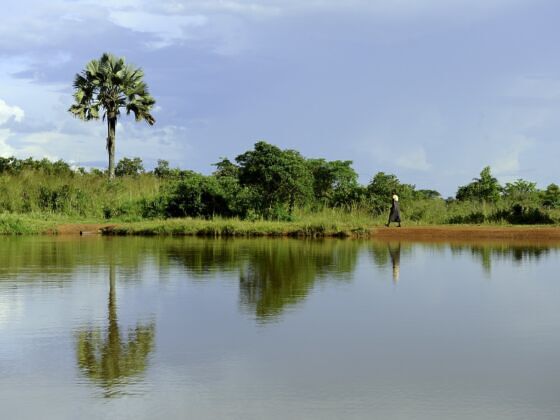Boda drivers, the young, tank-topped men who operate Gulu’s hundreds of motorcycle taxis, have eyes like hawks. As they drive, they scan the people walking by the roadside, searching for a pointed finger, a set of raised eyebrows, a nod—anything signaling interest in a ride. Most mornings, from the shoulder of the main road that runs by my house, I start my commute to work with a nod or a wave.


Usually, once they notice your signal, boda drivers will slam on their brakes, pull a dangerous U-turn into oncoming traffic, and race over to you; in a place where streets buzz with the sounds of competing taxis, no fare is guaranteed until a customer is planted on the back of your bike. After exchanging pleasantries, we slip into a stream of motorbikes and bicycles heading to town in the early morning chill.
On my way to work, I pass shop owners downtown. Hunched over, they sweep the verandas in front of their stores with short, wicker brooms. Clouds of orange dust peel away from them and drift down into the wide gutters that line the street. Dust blows into town each night, blanketing the verandas, yet each morning it rises into the air again with the quick jabs of brooms.
On my way to work, I pass packs of students in bright purple uniforms walking to school. Boys and girls alike have shaved heads. Some wear shoes or sandals; others, the ones with plump, hardened feet, walk barefoot. If the younger kids catch a glimpse of me whizzing by, they’ll scream out Muno! or Muzungu!—words in Luo and Swahili respectively that mean ‘white’ and ‘foreigner.’
On my way to work, I pass the main market. Bleary-eyed vendors set up their stalls each morning, arranging a myriad of functional things on their plywood shelves—used shoes, boxes of toothpaste and soap, old radios, electric cords, nails, belts with hologram buckles, wash basins, plastic chairs. Each morning the vacant stalls fill with goods; each night they empty.
On my way to work, I pass cyclists of every variety. One particular man in knee-high rubber gumboots rides with a cavernous wooden box lashed to a rack above his back wheel. The box is filled to the brim with the severed legs of different types of animals—cow, goat, lamb, and pig. The meat is red and sinewy, bright against the white paint of the box. Blood drips from a corner of the box in fat crimson drops, staining the butcher’s route onto the street each morning. Another man stops at the market with a few dozen live chickens tied to his bike. A few dozen. In pairs and with their feet bound, the birds hang upside down from his handlebars in silence, unaware of the fate that awaits them. I pass fathers cycling their children to school, bicycle taxis taking people to work, and soda deliverymen clinking along over the bumpy dirt road with crates of glass soda bottles.
On my way to work, I pass the bicycle repair shops that keep the cyclists moving. Squatting in the middle of a puddle of scattered tools, repairmen with ever-greasy hands replace spokes and fix flats by the roadside.
On my way to work, I pass mothers. Some have babies tied to their backs, a small pair of child’s legs straddling their waists. Some, on their way to the water pump, carry yellow jerry cans in their hands. Others balance a round basket of clothes or a tray of bananas atop their heads: bulky crowns of domesticity.
On my way to work, I pass a noisy reed hut that houses a small generator. Inside, people pay an old man with stringy arms 500 shillings [$0.25 US] to charge their cell phones.
On my way to work, I pass smoking stacks of mud bricks—kilns made of the product they fire—some three or four meters tall. Next to the stacks, invariably, are pits in the ground: holes where the brick makers gathered their mud. Long logs, fuel for the fires that bake the bricks, are fed into ovens at the bases of the stacks. Smoke floats above the kilns like wispy gray hair caught in the wind.
On my way to work, I pass dense mango trees sagging under the weight of their swelling fruit.
When we reach Pece Stadium, the largest outdoor sports field in northern Uganda, I can catch a glimpse of my office at the end of the street. We ride past Save the Children’s office, past some of the old brick houses with metal roofs that were built half a century ago when Uganda was still a British protectorate, and past the woman on her porch who sells chapatti and always waves to me.
At the gate to our office compound, ten minutes after the ride started, I fish out a thousand shilling note [$0.50 US] from my wallet and offer the boda driver the customary end-of-ride farewell: Apwoyo. Thank you.
Community Connection
What happens on your way to work? What do you see? How do you travel? Immerse us in this brief part of your day. Please send submissions to heather@matadornetwork.com with “On My Way To Work” in the subject line.